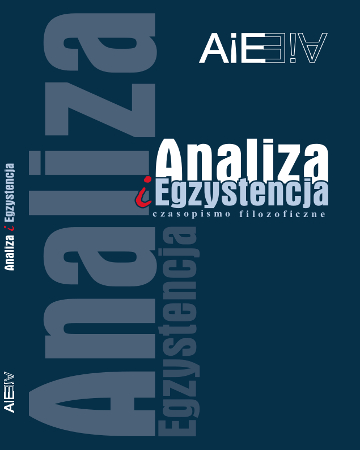
ISSN: 1734-9923
eISSN: 2300-7621
OAI
DOI: 10.18276/aie.2018.43-01





Issue archive /
43 (2018)
On the notion of well-being
| Authors: |
Katarzyna
Lazari-Radek

Uniwersytet Lódzki |
| Keywords: | well-being good for us good for the world resonance requirement F. Feldman P. Railton H. Sidgwick Sumner |
| Data publikacji całości: | 2018 |
| Page range: | 18 (5-22) |
Abstract
The aim of the article is to present a formal definition of well-being and to search for a quality that would allow to differentiate prudential values from other kinds of values. In order to achieve this aim, I will first look at a historical discussion run in analytical philosophy. This will allow me to state how not to understand the notion of well-being. Then, I will concentrate on a positive definition. I hope to be able to offer a necessary (though not sufficient) requirement for all prudential values.
Download file
Article file
Bibliography
| 1. | Campbell, S.M. (2015). The Concept of Well-being. In: G. Fletcher (ed.), The Routledge Handbook of Philosophy of Well-being (pp. 402–413). Oxford: Routledge. |
| 2. | Crisp, R. (2016). Well-being. In: Stanford Encyclopedia of Philosophy. Retrieved from: https://plato.stanford.edu/entries/well-being. |
| 3. | Darwall, S. (2002). Welfare and Rational Care. Princeton: Princeton University Press. |
| 4. | Feldman, F. (1988). On the Advantages of Cooperativeness. In: P. French, T.E. Uehling, H. Wettstein (eds.), Midwest Studies in Philosophy, vol. XIII (pp. 308–323). Notre Dame: University of Notre Dame Press. |
| 5. | Feldman, F. (2004). Pleasure and the Good Life. Oxford: Oxford University Press. |
| 6. | Feldman, F. (2006). What is the Rational Care Theory of Welfare? Philosophical Studies: An International Journal for Philosophy in the Analytic Tradition, 3 (130), 585–601. |
| 7. | Fletcher, G. (2016). The Philosophy of Well-being. Oxford: Routledge. |
| 8. | Foot, Ph. (1985). Utilitarianism and Virtues. Mind, 94, 196–209. |
| 9. | Galewicz, W. (2016). Dobro dla kogoś i dobro dla świata. Przegląd Filozoficzny. Nowa Seria, 1 (97), 33–44. |
| 10. | Harsanyi, J. (1982). Morality and the Theory of Rational Behaviour. In: A. Sen, B. Williams (eds.), Utilitarianism and Beyond (pp. 39–62). Cambridge: Cambridge University Press. |
| 11. | Heathwood, Ch. (2010). Welfare. In: J. Skorupski (ed.), Routledge Companion to Ethics (pp. 645–655). Oxford: Routledge. |
| 12. | Moore, G.E. (1922). Principia Ethica. Cambridge: Cambridge University Press. |
| 13. | Parfit, D. (1984). Reasons and Persons. Oxford: Oxford University Press. |
| 14. | Railton, P. (2003). Facts, Values, and Norms. Cambridge: Cambridge University Press. |
| 15. | Rawls, J. (1971). A Theory of Justice. Cambridge (MA): The Belknap Press of Harvard University Press. |
| 16. | Rutkowski, M. (2015). Wartość osobowa. Analiza i Egzystencja, 32, 5–48. |
| 17. | Rutkowski, M. (2016a). Czy istnienie może być lepsze albo gorsze od nieistnienia? Część I: Ustalanie wartości w ramach dobrostanu. Analiza i Egzystencja, 35, 23–44. |
| 18. | Rutkowski, M. (2016b). Czy istnienie może być lepsze albo gorsze od nieistnienia? Część II: Wartości osobowe a obiektywne racje moralne. Analiza i Egzystencja, 36, 25–51. |
| 19. | Scanlon, T.M. (1998). What We Owe to Each Other. Cambridge (MA): Harvard University Press. |
| 20. | Sidgwick, H. (1874). The Methods of Ethics. 1st ed. London: Macmillan. |
| 21. | Sidgwick, H. (1907). The Methods of Ethics. 7th ed. London: Macmillan. |
| 22. | Sumner, L.W. (1996). Welfare, Happiness, and Ethics. Oxford: Clarendon Press. |
| 23. | Taylor, T.E. (2013). Well-being and Prudential Value. Philosophy & Public Policy Quarterly, 2 (31), 10–17. |
| 24. | Williams, B. (1982). The Point of View of the Universe: Sidgwick and the Ambitions of Ethics. The Cambridge Review, May 7, 183–191. |
| 25. | Woolf, S. (2006). Deconstructing Welfare: Reflections on Stephen Darwall’s. Welfare and Rational Care. Utilitas, 4 (18), 415–426. |